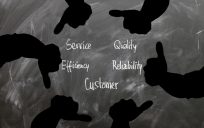Originally published on Tri Tuns blog Insights.
One of the smartest men of our time, Albert Einstein, defined insanity as doing the same thing over and over again and expecting different results. Which, when it comes to IT investments begs the question of why so often people go through the usual motions to pull off an implementation only to “go live and go home” while still expecting this time it’ll be a better experience for everyone involved and thissoftware will save zillions? But if you’re doing the same thing you’ve always done, how exactly will the results this time be different?
as doing the same thing over and over again and expecting different results. Which, when it comes to IT investments begs the question of why so often people go through the usual motions to pull off an implementation only to “go live and go home” while still expecting this time it’ll be a better experience for everyone involved and thissoftware will save zillions? But if you’re doing the same thing you’ve always done, how exactly will the results this time be different?
Crazy, right?
(Or maybe this is Einstein presciently explaining the often-reported and historically stagnant CRM failure rates of 50-75%? Just a thought.)
I work with IT effectiveness and user adoption specialists and what we hear from our clients are things like “oh, but this time it’ll be different because we’ll have more training”, or “this new software will change everything, it’s completely intuitive” or “it’s the cloud, so that’s different, right?” I hate to break it to you, but just like with all bad habits in life, they’re easy to stick to and hard to change. (More on this in a future blog entry.)
Or, as we heard recently, “It’s not the software that fails, it’s the fleshware.”
When it comes down to it, technology does – sometimes infuriatingly so – exactly what you ask it to do.
But when it comes to people, the ‘fleshware’, let me ask you this: when was the last time a group of people did exactly what you asked them to do? Especially when you were changing the way they’d been doing something for years?
Ay, there’s the rub.
So now what? How do you rescue the resources you poured into the project and begin to create the value you were so sure you’d realize with this implementation, with this change? How do you stop beating your head against that Einstein quote and regain some sanity?
First, look at what the implementation project’s focus was, and what was the benchmark for ‘success’. Was it techno-centric and success was on-time and on-budget delivery? Or was it business-centric and success is the ongoing measurement and achievement of business/ROI goals?
Next, when the project began was there a holistic strategy focused on driving desired user behaviors and aligning all the organizational elements necessary to achieve business goals? Or was the strategy just to get to go-live and there wasn’t a plan for what happened after that?
Third, the only constant is change. What sort of plan is in place to manage the inevitable changes and unexpected issues thatwill arise? What kind of infrastructure is in place to identify and respond to gaps, threats, opportunities, issues and events?
A couple of quick resources:
- Still have questions and need some ideas about how your specific project could be helped? Take our quick assessment quiz – free and private, I promise! – and get some insight into how you might break your organization’s Einstein-ian cycle.
- With the rate of CRM failure being still ridiculously high, how can you succeed? Check out our eBook on avoiding CRM Failure Zone.




Brilliant post. Love it! This is my personal mantra at work: if you always do whatcha always done – you’ll always get whatcha always got!
And, really….if you don’t like whatchya got, why keep doing the same thing, much less doing it the same way? If you want something to change, change it. Thanks so much for your comment, Deb. I appreciate your enthusiasm!